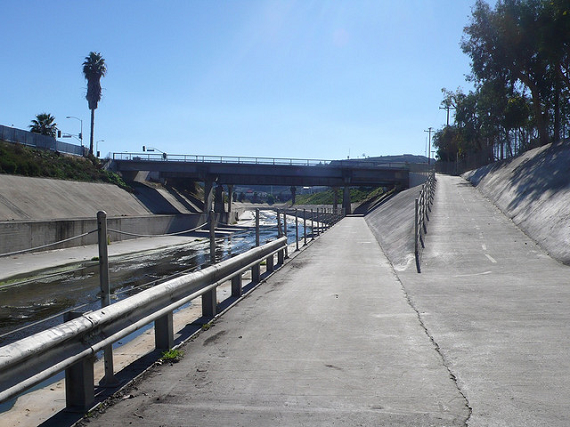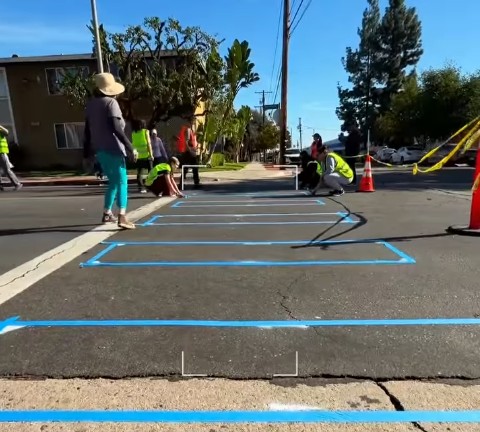
Senator Barbara Boxer is receiving bi-partisan praise for managing to move a transportation policy and funding bill through the Senate Environment and Public Works Committee in a divided Senate, but she may be facing trouble from a usually supportive constituency back home.
Regardless of how one feels about the new funding formulas proposed in the bill, there is no doubt that a provision in the MAP-21 highway authorization bill entitled "bicycle safety" would dramatically change cyclists' rights to the road and would force many cyclists to either break the law or put themselves in unsafe situations. The language in question reads:
BICYCLE SAFETY.—The Secretary of the appropriate Federal land management agency shall prohibit the use of bicycles on each federally owned road that has a speed limit of 30 miles per hour or greater and an adjacent paved path for use by bicycles within 100 yards of the road.
"The provision requires no minimum standard of safety or mobility on the sidepath, and experience shows that such paths are often more dangerous or impractical than on-road bicycling," explains David Snyder, the executive director of the California Bicycle Coalition. "The provision may have been well-intentioned but its result is to reduce safety and it should be removed."
Jim Baross, with the California Association of Bicycle Organizations explains further. "Most of our concern is that adjacent trails, paths or alternative facilities that bicycling might be detoured to do not provide anything near to the efficiency and safety provided by the shoulders of Federal highways," Baross begins. "At a time when there are significant and important efforts to encourage Americans to use bicycling as a healthy, environmentally appropriate and economic transportation choice, it is ironic that a proposal for prohibiting bicycling, such as this, would be included in a transportation bill."
The real-world implications of such a change would be felt throughout the state, but Bikeside President Alex Thompson explains some of the local impact. After first noting that this law would require a lot of municipalities to get out their measuring tape and that it would effectively ban bikes from the Pacific Coast Highway in Santa Monica, Thompson notes many of the other implementation problems with the language as written.
"Are their places where Dockweiler is within 100 yards of Vista Del Mar but only for 1/4 mile? If there are, then you would have to switch over and back all the time," Thomspon begins. "And there's the issue of how you tell cyclists that they have to getoff the road, turn, right, proceed past two apartment buildings, and join the secret hidden bike path you didn't know about. It's chock full of holes as written."
But even if lawmakers find a way to tinker with the bill language to tighten up Thompson's complaints, there is still the issue that taking away a cyclists' rights to decide what route is the safest way to travel isn't making anyone safer.
At Cycleicious, Richard Masoner takes note that as the days get darker, the number of assaults that occur on isolated portions of bike paths goes up. For this reason, forcing cyclists onto these dark and scary bike paths is an inherently bad idea. Or, as Alexis Lantz, planning director of the Los Angeles County Bicycle Coalition simply notes, "Too often we see paths implemented along federal or state highways that result in creating personal safety issues. The federal transportation bill should not be limiting places where people can ride, but instead encouraging and creating more places and opportunities for people to bicycle to meet their daily needs and/or for recreation."
And while cyclists are worried that this provision could make rides for cyclists more dangerous, at Bicycle Fixation, Richard Risenberg asks a question so basic that it went right past many people looking at this issue, myself included. What happens if the bike path doesn't go where you want to go? "This is really pretty absurd. A bike path 300 feet to the side of a standard road (federally funded or not), may very well not lead to destinations bicycle users may want or need to access."
MAP-21 passed the Senate's Environment and Public Works Committee last week. A hearing from the full Senate has yet to be scheduled, and Boxer's counterpart in the House of Representatives seems less than thrilled with the Senate bill for reasons that have nothing to do with bicycles. For more coverage of MAP-21 and all Capitol Hill issues, visit Streetsblog Capitol Hill.






